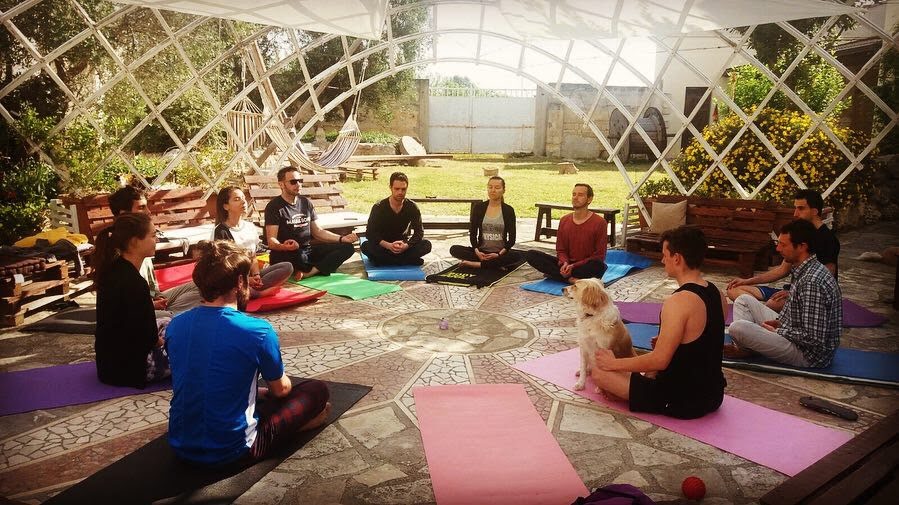“If you want to learn something, read about it, if you want to understand something, write about it, if you want to master something, teach it.” Yogi Bhajan
Yoga, meditation and sharing circles
EU funded ERASMUS+ programme, which supports educational projects in Europe and partner countries, has been recently catching the wave of mindfulness. Training courses and youth exchanges more and more often involve mindful activities like yoga, meditation or sharing circles. This turned to be especially relevant once support for mental health became a priority in youth work and Erasmus+ programme. Moreover, interest in mindfulness among NGOs encouraged youth organisations to shift their attention to what is attractive for youths.
As someone walking the path of meditation, I could not miss the opportunity to share meaningful tools learnt from the Peace Revolution. Having in mind how beneficial self-development tools are, it’s a must for them to be learnt by youth workers.
Tools for mindfulness
So what steps can be taken to add a sip of mindfulness into your ERASMUS+ projects? Below are a few ideas:
- No intoxicants tolerated. Which means that in the infopack, it is clearly stated that the event promotes mindfulness culture. This means that no intoxicants are tolerated during the training course/youth exchange. Each participant who is selected must fill in the application form and put a tick to agree with this clause.
- Personal culture evenings instead of intercultural evenings. As we know, all of the trainings involve intercultural night devoted to getting familiar with each other. Often, intercultural sharing involves sharing of snacks and traditional drinks, staying up late with loud music. In mindfulness culture, we are much more than the cultures we grew up in or where we live. We are a little bit of everything. It is attractive and diverse to present what our personal culture is rather than hiding behind presenting stereotypes and labels. Besides, it is more beneficial for inner peace to skip the traditional drinks and staying up late. Thus, you can offer your group to choose anything from personal culture be it a song, poem (even written personally), favourite quote, dance, performance, whatever is meaningful for a participant. This creates a mindful binding connection between the group and allows deeper self-development for further activities.
- Suitable venue. An ideal venue for mindfulness is some place away from the city, away from bars, cafes and shops, emerged in nature, where one can forget the busyness and the urge for comforts. Ideally, if owners of the place are supportive for the culture of mindfulness and encourage it by their presence and arrangement of the space.
- Limited wifi. Which is a tool for strong interpersonal connection and supports being present. This is very easy when the chosen venue is outside the city, away from connection.
- Early morning yoga/meditation. It can be offered by one of the participants or a guest teacher. This helps the group to get out of their usual habits and offers an opportunity to start a new habit, sometimes trying something which was never tried before.
- Few minutes of meditation before every session. It is helpful for the trainers to keep attention and unity of the group, as well as beneficial for participants to start developing a new habit.
- Spiritual evening activities. Examples are dance mandala, meditation, limelight, poem night or whatever which can exchange an urge to spend evenings in a non-mindful way. It benefits the team to find meaningful ways of having fun, as well as gives alternative ideas of “party” to be brought back to local communities.
- Posters with mindfulness tips in diverse spaces. Suggestions are: tips for mindful eating, talking, walking, sleeping, brushing teeth, etc. Besides reminding participants to be mindful, it’s a support for the visibility of the event for everyone who is visiting the venue as each poster can also have a logo of the European Commission (EC).
- “Daily Mindfulness” journal – also called “Be at the Center” game. With it, participants are encouraged to write down all their thoughts upon waking up and to evaluate how present they were in different activities before going to bed. The tool can be used as a game where the ones sincerely filling the journal each day are given a special treat at the end. For the event, it is a bonus to help participants reflect daily and can be used as a reflection tool, which is crucial for all non-formal education events and a great alternative for the usual reflection tools.
- Catching goodness in others (Jab Dee). It is an alternative for “secret friend” game, where instead of gifts, participants are leaving sincere, logical compliments for each other in the envelopes, which are distributed at the end of the training.
To conclude
In case additional insights are needed, WPI Peace Architects are there to support the ones in search of depth. As trainers, guest trainers, meditation teachers, yoga teachers or participants, we are happy to connect. Let’s put mindfulness in unexpected places!
For more information, feel free to drop a line to: positiveyouth.se@gmail.com
Some organisations adding mindfulness into ERASMUS+: ASHA center in UK; VulcanicaMente in Italy; Sabai Trainings in Hungary; Actions for Change in Romania; Well-being Lab in Sweden; Positive YOUth in Lithuania.
If you want to start a journey towards yourself, join our online self-development program, and download our Mind stories app.


